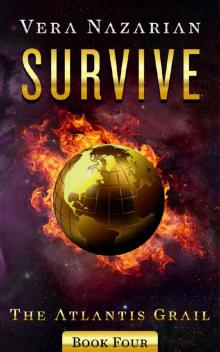- Home
- Vera Nazarian
Compete Page 3
Compete Read online
Page 3
Apparently, while we were all sleeping last night and then hanging out in our barracks half the day, our things were being located and delivered across ships to the proper places.
At some point in the first hour of waiting, I recognize my familiar duffel bag and backpack unloaded by a hovering robot, and I feel a surge of ridiculous tears at the sight. I eagerly take my things—the last familiar things of Earth—and I rummage through them, touching precious books, trinkets, while Gracie and Gordie wait nervously for their own stuff to be delivered.
Eventually we all have our possessions. Which means we have a fresh change of clothing and clean underwear.
Which means we can get properly cleaned up at last.
For the remainder of day one, we and the rest of the Qualified, take showers, eat in Atlantean meal halls, which unsurprisingly resemble Earth cafeterias except for the weird food (about which I will comment later), receive medical attention for injuries acquired during the Finals, and then keel over and sleep in our temporary bunks.
We are awakened the next day at 7:00 AM, UTC, by daylight illumination and Atlantean officers coming to the barracks chambers to give us an hour’s notice warning—our departure from Earth orbit will begin shortly.
“There are large observation decks all along the perimeter of this ship, and you may stand and watch out of the windows as the Earth recedes,” an Atlantean tells us gently. And then he explains how to get there.
Immediately there is general tumult. Naturally everyone is interested in seeing Earth for the last time, and there is a stampede of sorts. But another Atlantean blows a harsh whistle and we are told to line up in orderly fashion and be ready to go in half an hour, at which point there is a bathroom rush instead.
I vaguely remember holding Gracie’s clammy hand as thirty minutes later we race in a big crowd of strangers through the great ship.
“Okay, where are we going?” international voices sound all around us as we jostle.
“Pao, pao! Kuai! Zai na?”
“Where exactly is this observation deck? What time is it?”
“Ta bu zhi dao! Ni zhi dao ma? Shuo shen ma?”
“¿Qué dice? ¡No importa, ahorita, muévete!”
“How much longer? This place is a maze!”
We move in a fast jog for at least fifteen minutes, going through endless deck levels and corridors past sections of the ship for which we still have no words, until we arrive at the outermost perimeter. The narrow corridor opens suddenly into a vast panorama.
Here we grow silent and stop.
The outer hull of the ship is bathed in shadowy twilight on the interior, dimly lit with strips of violet plasma glow near the floor, while the ceiling is cast in darkness. The hull walls are fitted with large, floor-to-ceiling rectangular sections of unbreakable transparent material that looks like glass, spaced regularly every few feet. Through it we see a grand vista of black space sprinkled with crystal clear dots of stars . . . all around, hundreds of silver disks of the Atlantean fleet hover like blossoms in the sea of vacuum . . . and directly below, lies the hemispheric shape of a large bluish planet. . . .
Earth.
Gordie sucks in his breath. And Gracie clutches my fingers tighter, as we all stare.
Logan stands directly behind me, looking grimly at the sight. Everywhere teenagers crowd near the display panels, looking out and beyond. There is mostly hushed silence and occasional reverent whispers.
Minutes later, an androgynous machine voice sounds from the hull walls all around us. It is speaking Atlantean, then English, then repeating in other major languages of Earth in a delayed echo of seconds, like a strange linguistic chord.
“Commencing Departure Countdown in ten seconds.”
The Atlantean officers and crew standing with us at the observation deck give us silent sympathetic looks.
“Ten . . . nine . . . eight . . .”
Is it really happening? I glance around me suddenly, desperately, at the other young people all around the darkly lit deck.
“. . . Seven . . . six . . .”
The Earth—it is heartrendingly beautiful. Great swirls of white clouds float softly, and the continents pass directly below us.
“. . . Five . . . four . . .”
There’s the Atlantic Ocean, a deep inky blue. And to the left, the shoreline of North America, still cast in night’s shadow at 4:00 AM Eastern Time, and sprinkled with golden lights of populated areas . . . the United States. Just there, the northeastern tip, near the Great Lakes and slightly over, but just below Canada, is the tiny triangle that’s Vermont . . . Mom and Dad and George are right there, contained within that tiny dot of space, my home.
“. . . Three . . . two . . .”
I stare at the spot hungrily, wishing with all my soul to rush toward it, like a speeding bird, a morning lark. My lips part as I whisper silently, gripping my little sister’s cold fingers, tight.
“. . . One . . .”
“Commence Departure.”
And suddenly, there is a deep rumble. It builds somewhere all around the hull of the ship, like an immense chord of plural notes, a grand C Major chord.
And as it builds, the ark-ship starts to tremble. . . . Soon we can feel the vibration all the way to our bones, the buildup of immense unspeakable forces through the floor underneath our feet, the hull walls, the ceiling.
As we look out through the windows, the other ark-ship disks scattered all around us in orbit start to glow. Their silver outsides emit a faint violet plasma radiance, so that the metallic orichalcum surfaces begin to “dissolve” visually. In seconds all they seem to be are molten discs of lavender light.
And then it happens.
Gracie makes a stifled sound and squeezes my hand painfully. Because the hemisphere shape of the Earth outside the windows begins to float away.
It is so gradual, that at first you experience it as a brief lurch of vertigo, a sudden disorientation in regard to what exactly is moving, you or the world. But in seconds it becomes clear—the movement is external to the self and very real.
You perceive that subtle motion in the way the entirety of the Earth begins to fill the view as it slowly rises in the window. Soon the partial view transforms into the full shape of the entire planet, as it simultaneously shrinks softly and retreats from us like a balloon lifting skyward, and eventually stabilizes and keeps its relative position in the window.
With each passing minute the planet grows smaller, gently, softly.
There is no urgency in this departure, the visual changes microscopic. And yet, it is an optical illusion, because the speed must be incredible.
In a few more minutes we see the much smaller ball that is the Moon as it emerges from the other side of the Earth, and we pass its orbit, the perspective of distance finally allowing us to see it at that wider angle.
“Oh God . . .” someone whispers behind us in the dark.
“Mom! Daddy!” Gracie says. “I want Mom! Mommy, Daddy! No!”
And then she is bawling silently, shoving her face against me, no longer holding back.
She is not the only one. I tremble, holding Gracie against my chest, as the lump inside my own throat pushes at me, but somehow I keep it at bay.
Next to me, Gordie’s eyes are a blur. I can see the wet glimmer past his smudged glasses. He sniffles with his nose, shifts from foot to foot, bumping my shoulder with his own.
“Good-bye . . .” teen voices sound in awe and mourning and helpless wonder. Minutes tick away. Half an hour passes, then an hour, and few of us notice.
I continue to watch the retreating sphere of Earth. It is now the size of a penny, so that you can just barely see the white dot that is the Moon—the Earth’s satellite’s albedo is beginning to match in size just any other star sprinkled in the cosmic background.
The other major reference point is now the Sun, a ball of yellow fire the size of a coin. At some point in the last half hour it has entered the scope of our view and taken up permanent r
esidence in the spacescape. We are told not to look at it directly for more than a few minutes at a time, even though the observation windows are equipped with protective anti-glare shields.
I blink and stare at all of it—the Sun, the Earth, the stars, the black vacuum—allowing myself to consume the grand picture, imprinting it upon my mind’s eye. . . .
It is then that I notice that the ship disks of the rest of the Atlantean Fleet outside the window are lining up in regular fixed intervals all around us—or maybe they have lined up a while ago, for many long minutes now, and I simply haven’t noticed, haven’t been paying attention—and we are flying in some kind of formation.
In fact, does it seem that the motion itself is leaving a physical trail?
And then I am absolutely sure of it, yes.
The ark-ships stretch out in a long illusion of a comet-tail behind us and off to the side all around us . . . and, I am guessing, just as many are far ahead of us. And it seems that all beyond our formation the stars too acquire an optical illusion of tails, as everything, the entire universe, is being pulled and elongated slightly, from the velocity of our movement.
What did Commander Manakteon Resoi call it?
We are entering a physical state called the Quantum Stream.
Chapter Two
That was three days ago. For three days all we did was watch the Earth and Sun recede outside the observation deck windows. Whenever I went there, the observation decks were always packed with teens staring out at the cosmos—mesmerized, dazed, drunk with the view, blinking at the tiny little blue marble of Earth as it was at some point silhouetted against, and then reflecting the light of the bright spot of pale yellow fire that was our Sun. As for the Sun, wow . . . it was still holding out its relative size and position for the most part, though I know it was microscopically shrinking every time I returned for a gazing session, which was at least every few hours.
And when we got tired of the panorama of space, we would return to our temporary barracks. Since even now we’re discouraged from simply wandering the ship aimlessly until we know our duties and place in it, there was nothing else to do. There in the barracks we would sit around and think, often out loud, about the tough choice ahead of us. I remember it in vague snatches—people talking, reminiscing about life on Earth, their families, the current events, the pending destruction.
My sister and brother and Logan, the only people I know who made it here with me on this particular ark-ship—I see their stressed intense faces etched in the unreliable memory of those days, as we go over, point by point, the advantages and disadvantages of each choice.
Meanwhile, how is Earth dealing with our departure? Are there new wars now, more horrible chaos? Does the despair overwhelm our loved ones, now that we are gone?
“Oh God . . . are they okay?” Gracie asks me constantly.
“Yeah, they are,” I say. “You know how Dad said, the worst of the unrest is mostly in large urban centers, you know, big cities? So, I am sure they are perfectly fine.”
Gracie’s expression is unconvinced. Yet again she sits with her feet up on my bunk, fiddling with a cheap bangle bracelet that she took out from her jewelry pouch. It gives her comfort, I guess, like handling the beads of a rosary.
“So, Civilian, right?” I ask, changing the subject.
Gracie scrunches her face. “I guess. Okay, maybe . . . I don’t know!” she whines. I knew it would take her mind off the sad thoughts of home. For these past three days Gracie has been changing her mind back and forth on the Cadet or Civilian choice.
“Gracie, seriously. Do you really want to train to be a soldier? To put your life on the line for Atlantis? To potentially kill other people?” I tell her.
Gordie on the other hand is solidly decided, but for some reason won’t tell us his choice. My little brother can be so annoyingly stubborn sometimes, so withdrawn into the artistic echo chamber of his own head that I want to shake him and slap him around. I am terrified he is going to make a dangerous wrong choice, but then, who am I to judge what choice is best? And so again, for maybe the millionth time, I wish that George was here to give his smart perspective, his big brother advice.
Because, honestly, even after all the information and reference materials we’ve been given, we only have a very general idea of what it means to be a Cadet or a Civilian. The former involves joining their military, and rigid discipline and training. The latter, well, basically it’s the default position in society.
Unlike my siblings, Logan has made his inevitable decision immediately.
“Gwen, I have to join the Fleet Cadets,” he tells me on the night before the fateful Decision Day, as we have come to call it, as we talk quietly away from the others, standing in the semi-anonymous twilight of the observation deck, watching the constant visual anchor that is the Sun disk. The Earth, it is like a small bead, now . . . a pearl on the black velvet of space.
“You understand why, don’t you?” he says. “It’s part of what my orders are.”
By orders, he means the fact that he is part of secret United States government special ops, an organization called Earth Union. And he has been tasked to infiltrate the Atlantean deep layers of society, for reasons that supposedly involve ultimately doing more on behalf of Earth than just saving the ten million Qualified at this time of the impending asteroid apocalypse.
How is that even possible? What more is there to be done? How can anyone else on Earth be saved?
I have no idea, and I have serious doubts. But I trust Logan’s motives and integrity even if I don’t think there’s anything he or anyone else in Earth Union can actually accomplish. I believe that Logan wants to do the right thing, according to what he believes in. I also know in my heart that Logan Sangre—this remarkable boy I’ve had a crush on for years, and whom I might actually dare to call my boyfriend at this point in our acquaintance—is smart, capable, and not a terrorist.
“As a Cadet, I will be close to the action, close to their military high command,” Logan tells me. “I will be listening and watching, and looking for sensitive information that may help us—help Earth.”
“Supposing you do find something, how do you expect to relay any of that useful information back to Earth, when we’ve already left orbit and are more than halfway to Mars by now?”
He looks at me, and smiles very lightly. “That’s not something you need to worry about.”
Okay, again I have no idea what that means, but I can make an educated guess—Logan either has some kind of fancy special technology to communicate with Earth, or knows someone on the inside, someone Atlantean, and they have the means to relay the information back.
As for me? When I start to consider the pros and cons of being a Cadet or a Civilian, I feel a rush of rising panic. And yet, I too have made a very early and firm decision.
Today is the fifth day onboard the ark-ship—Decision Day. Our life decisions will be formally announced today. And yes, incidentally, today is the day we reach and pass the orbit of the proverbial Red Planet. Unfortunately, Mars is somewhere on the other side of the Sun right now, so we won’t be able to actually see it as we fly past its orbital boundary, sometime later today, around 2:13 PM, UTC.
Starting at 9:00 AM, we are to be called in groups of about ten people before a panel of Atlantean commanding officers on our ship. All of this is scheduled to happen in the large meeting chamber located near the central hub of the Command Deck. There we will be interviewed individually, our ID tokens scanned and our choices witnessed and recorded. Yes, this is a formal ceremony, and afterward, there will be no going back.
We wake up at 7:00 AM UTC—the ship is functioning on Earth time for our sake. In addition, this is reminiscent of our Qualification training schedule.
Over these past five days I’ve gotten accustomed to not hearing claxon alarms, but instead seeing a growing brightness as it somehow seeps past my closed eyelids. The light itself is sufficient to wake you. I am not sure how it works exactly, even
if you have a blanket drawn over your face—but it does. And I admit, as a wake-up method it is far less jarring, so I prefer it.
And so, I open my eyes, squint and stretch tiredly, and then the clarity of stress hits me, as I realize what day it is.
Everywhere around me I hear noises of waking teens and rising conversation. This temporary barracks is co-ed, so boys and girls make their way to the same lavatory facilities in the back of the long chamber, separated only once you’re inside, into the men’s and women’s portions. Apparently now that we’re all Qualified, Atlanteans don’t seem to care if we fraternize—or maybe we’ve been simply given a temporary break until we “move in” properly.
In the bunk above me, Gracie is still asleep, curled with her blanket over her head, so I stand up and touch her gently. My younger sister has her usual problem getting up in the morning, regardless of when she went to bed the night before, so I take my time with her. In addition, over the last few days, ever since the trauma of Qualification and losing George, Gracie seems to have reverted to her childish, younger, whiny self. Just like that, she’s let go of her tough exterior and semblance of maturity she’d gained from the two months of training with the Red Quadrant. I am guessing it might be a form of post-traumatic stress disorder, and I hope it’s temporary.
“Gracie!” I whisper near her ear and tap her shoulder. “Gracie, you need to wake up now, today’s the big day. Come on, Gee Four, up, up!”
“No-o-o-o-o!” Gracie moans, clinging to her blanket, and does not move.
Meanwhile I can hear Gordie on the first level bunk closest to mine, waking up and yawning loudly.
In that moment Logan looks down at me from the third level bunk directly above. His dark hair is tousled, and his face is softened with sleep. “Hey, you,” he says, in an intimate voice that cracks, and there is something boyishly vulnerable in the way he just stares and blinks at me, and then smiles.

 Cobweb Bride
Cobweb Bride Survive
Survive![[Atlantis Grail 01.0] Qualify Read online](http://i1.bookreadfree.com/11/atlantis_grail_01_0_qualify_preview.jpg) [Atlantis Grail 01.0] Qualify
[Atlantis Grail 01.0] Qualify Lords of Rainbow
Lords of Rainbow Cobweb Forest (Cobweb Bride Trilogy)
Cobweb Forest (Cobweb Bride Trilogy) Compete
Compete Cobweb Empire
Cobweb Empire Northanger Abbey and Angels and Dragons
Northanger Abbey and Angels and Dragons Dreams of the Compass Rose
Dreams of the Compass Rose Win
Win The Clock King and the Queen of the Hourglass
The Clock King and the Queen of the Hourglass The Duke In His Castle
The Duke In His Castle Old Farts
Old Farts